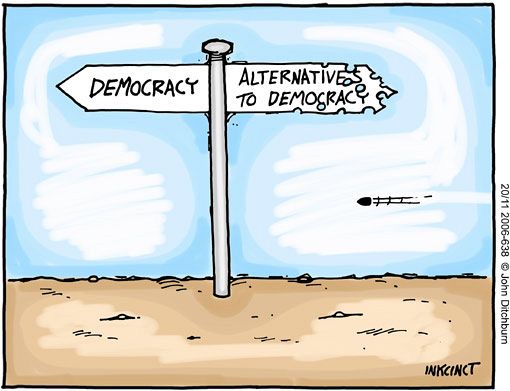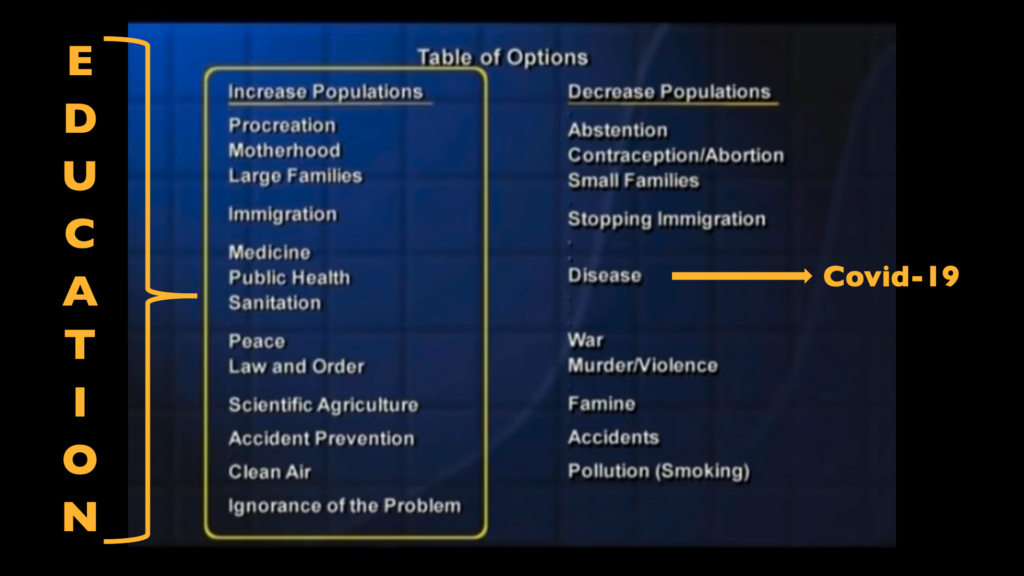
Isaac Asimov’s bathroom metaphor is famous and as Aldous Huxley once said: A fact doesn’t disappear by ignoring it. Western nation states however pretend that population growth does not impact the democratic model while it slowly declines right before our eyes.
Donald Trump’s presidency and the attack on democratic institutions like the one on the US Capitol last year, a dictator-like regime in Austria from 2017-2021 under the youngest ever chancellor Sebastian Kurz and three chancellors within a few weeks in December 2021 (an absolute novelty in post WWII Western democracies) are manifestations of what Ken Wilber once called aperspectival madness.
In fact, these events follow the laws of nature and show that we need a new form of governance.
The grand master of the exponential function, Al Bartlett, wrote a short and readable article about the connection between the democratic decline, technological advancement and population growth which quotes Asimov in lucid manner.
Bill Moyers:
“What happens to the idea of the dignity of the human species
if this population growth continues at its present rate?”
Isaac Asimov:
“It will be completely destroyed. I like to use what I call my bathroom metaphor:
if two people live in an apartment, and there are two bathrooms, then both have freedom of the bathroom. You can go to the bathroom anytime you want, stay as long as you want, for whatever you need. And everyone believes in Freedom of the Bathroom; it should be right there in the Constitution.
But if you have twenty people in the apartment and two bathrooms, then no matter how much every person believes in Freedom of the Bathroom, there’s no such thing. You have to set up times for each person, you have to bang on the door, ‘Aren’t you through yet?’ And so on.”
Asimov continues with what could be one of the most profound observations of the 20th Century:
“In the same way, democracy cannot survive overpopulation; human dignity cannot survive [overpopulation]; convenience and decency cannot survive [overpopulation];
as you put more and more people into the world, the value of life not only declines, it disappears.
It doesn’t matter if someone dies, the more people there are, the less one individual matters.”
Read Al Bartlett’s essay and you will understand why the threat to democracy does not originate in authoritarian China, but in the Western elites’ unwillingness to reform democratic decision making.
China’s own overpopulation problem can teach the democratic West that another form of governance – if not a totalitarian – is inevitable – no matter whether we praise China’s absolutism or work on more humane alternatives.
A simple example on what Al Bartlett’s political arithmetic teaches us:
The number of members in the US House of Representatives is since 1913 capped at 435. The democratic rate of representation was then 97 mio inhabitants divided by 435: 223,000. The democratic rate of representation for 2020 was 331 mio inhabitants divided by 435: 760,920.
Austria’s democratic parliament was founded in 1920 and replaced the national congress of the pre-WWI monarchy. It had then the same number of members as it has today. Let’s do the long division:
6,420,000 divided by 183 equals 35082.
This compares to 8,917,000 divided by 183 which equals 48,727 in 2020.
Political arithmetic teaches us that political systems converge: the bigger a population without a higher corresponding political representation, the less democratic and the more totalitarian the system becomes.
Political arithmetic also teaches us that smaller nation state entities are more democratic than a goliath like the US or China. Add to this the wealth accumulation caused by technology and you have spicy ingredients for social unrest which can only be contained by brutal force.
Under a merely arithmetic point of view – in disregard of what constitutions tell us about the form of government a country has chosen and whether democratic decision making is dysfunctional or not – China is by far more democratic than the United States.
There, 1.4 billion citizens are represented by 2980 delegates to the people’s congress which translates to 469,798 people being represented by one delegate.

I should mention that this condition extends to labor markets and education systems: the more people there are, the more unequal and unfair the frame conditions will be.
We have two routes which we can take from here:
One leads to the decimation of population through war and disease and is in the interest of the small number of people who own the majority of wealth and assets on this planet.
The second route leads to a new form of sharing and education in which finite resources and the need to allocate them fairly are precondition for genuine growth and the true unfolding of human potential.
Peter Drucker foresaw already many years ago that “if the 21st century will show one thing, then it is the futility of politics.” We have chosen route one already a few times. How about taking a different turn this time?